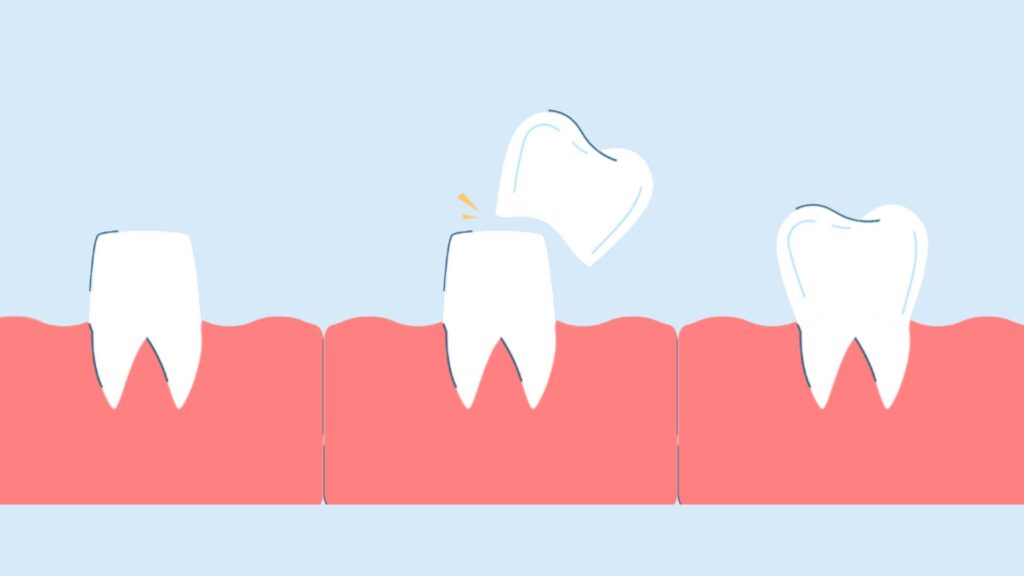Imagine enjoying a meal when you suddenly feel something unusual in your mouth, realizing your dental crown has fallen off. While this can be alarming, there’s no need to panic. Losing a crown is common, and with the right steps, it’s easy to handle. At Gentle Dental Care, we’re here to help you manage the situation calmly and restore your smile.
Why Do Crowns Fall Off? Common Causes
Dental crowns are designed for durability, but several factors can lead to them loosening or falling off:
Normal Wear and Tear: Everyday chewing can weaken the bond holding your crown in place.
Improper Bite: An uneven bite can create additional pressure, causing the crown to loosen or crack.
Tooth Decay: Decay beneath the crown can weaken the tooth structure and affect the crown’s stability.
External Trauma: Accidents or biting on hard foods can sometimes cause the crown to break or loosen.
What are the Immediate Steps to Take If Your Crown Falls Off?
If your crown falls off, follow these steps to manage the situation effectively:
Locate the Crown: Find the crown and keep it safe. Check your mouth, napkin, or any nearby surfaces. We may be able to reattach it.
Clean the Crown: Gently rinse the crown with water to remove debris or food particles.
Contact Gentle Dental Care: Call us as soon as possible so we can schedule an appointment and assess your exposed tooth and crown.
Schedule an Appointment: Though it’s not a dental emergency, prompt action is still important. We’ll work to get you in as soon as possible to minimize any discomfort and damage to the exposed tooth.
How to Protect the Exposed Tooth Until Your Appointment?
The exposed tooth may be sensitive, so it’s important to care for it until you see us:
Eat Soft Foods: Stick to soft foods like yogurt, mashed potatoes, and cooked vegetables to minimize pressure on the sensitive area.
Brush Gently: Use a soft-bristled toothbrush with warm water to clean the area around the exposed tooth, avoiding too much pressure.
Manage Discomfort: Over-the-counter pain relievers like ibuprofen or acetaminophen can help with pain. Always check with us for specific recommendations.
What to Expect During Your Appointment?
When you visit us, we will carefully examine the crown and the exposed tooth to determine the best course of action. If the crown is intact and the tooth is in good condition, we may be able to reattach it using a strong bonding agent. This is often the quickest and most cost-effective solution.
If the crown is damaged or the tooth needs additional treatment (like a root canal), we may need to create a new crown. We’ll guide you through the process and ensure your smile is fully restored.
What are the Tips to Prevent Future Crown Loss?
While some factors may be unavoidable, you can reduce the chances of losing a crown by following these tips:
Regular Checkups: Visit us at least twice a year for dental exams to catch potential issues early.
Good Oral Hygiene: Brush twice daily with a soft-bristled toothbrush and floss once a day to prevent decay and plaque buildup that can affect the crown.
Nightguards for Teeth Grinding: If you grind or clench your teeth at night, a custom nightguard can help protect your crowns from unnecessary wear.
Avoid Hard Foods: While hard foods don’t need to be completely avoided, be cautious of things like ice, hard candy, or nutshells that can damage your crown.
If you notice your crown feeling loose or insecure before it falls off, don’t wait—contact us right away. The sooner we can see you, the more likely we can reattach or save your crown.
Final Thoughts
Losing a dental crown can be an inconvenience, but it’s manageable when you follow these steps. At Gentle Dental Care, we’re here to restore your crown and ensure your smile stays healthy. Don’t hesitate to contact us with any concerns. By maintaining regular checkups and good oral hygiene, you can prevent future crown issues and enjoy a strong, healthy smile for years to come.


